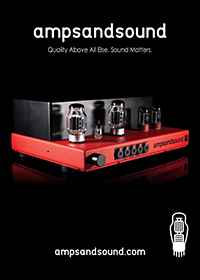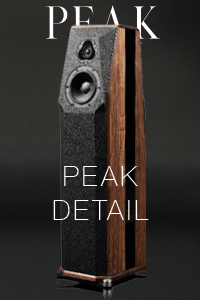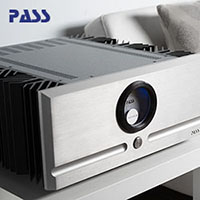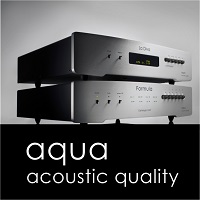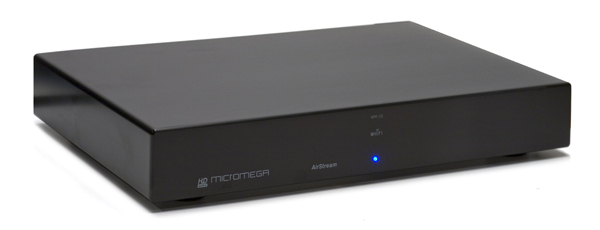 This is a controversial product to say the least. For many of you wanting to extend your digital music network, the $99 Apple Airport express is a great, low-cost way to add a pair of powered speakers somewhere into your environment. However, it is not an audiophile solution. At the other end of the spectrum, we have Micromega, with their $1,499 Airstream, which functionally does no more than the Apple Airport. We could have the same argument comparing the $300 Squeezebox to the $8,500 Sooloos music server. They both do the same thing, stream digital music files, but there’s more to the story.
This is a controversial product to say the least. For many of you wanting to extend your digital music network, the $99 Apple Airport express is a great, low-cost way to add a pair of powered speakers somewhere into your environment. However, it is not an audiophile solution. At the other end of the spectrum, we have Micromega, with their $1,499 Airstream, which functionally does no more than the Apple Airport. We could have the same argument comparing the $300 Squeezebox to the $8,500 Sooloos music server. They both do the same thing, stream digital music files, but there’s more to the story.
It is extremely difficult to use the Apple Airport Express in a non-Airport network environment. Personally, I’ve never been able to get one to integrate seamlessly in my own network, so for the duration of this review, I used a spare MacBookPro with about 300 mb of Apple Lossless, .wav and MP3 files for the duration of my test.
What’s in the box
The interesting paradox is that the Airport Express will probably need some support to make it work properly, and your chances of getting it are slim. If you purchase the Airstream from a Micromega dealer, your chances of getting dealer support are high, but you probably won’t need it. Next to the Sooloos, this is the easiest digital-music product I’ve ever used.
Setup is very easy. Plug the Airstream in any of your systems’ high-level inputs, turn it on and search for “Airstream” with your Mac or PC. It works well with either. If you are more adventuresome and have an AirPort-based network, you can use the AirPort Utility to change the address of the Airstream and make it join your existing Mac network. This might be handy if you have a large collection of music on a remote server somewhere that you’d like to access with the Airstream. I must admit, however, not feeling brave enough to be up to this task.
I found the easiest way to use the Airstream was to leave it in the stock configuration and use my MacBook Pro to control the music from my living room. That’s really the essence of the Airstream: keeping it simple. An added benefit of using the Airstream in this mode is that it isn’t taking bandwidth away from your primary network. In the past when using a laptop or Squeezebox on the same network as the rest of the house, it’s been easy to get dropouts in the music stream, should my daughter decide to download an episode of Family Guy in the middle of my favorite song. With music and computer data on separate channels, this is eliminated.
With your system set up in this manner, Micromega features an app that you can download to control all of this with your iPhone/iPod touch. For those with a remotely located server, this will make using the Airstream remotely even more fun. This will allow you the ease of controlling the Airstream from the bath tub, or wherever else you happen to be within its range. The iPod app makers I contacted all indicated that they have iPad apps soon to follow, so I anticipate using the Airstream via the iPad will be an oustanding music server environment.
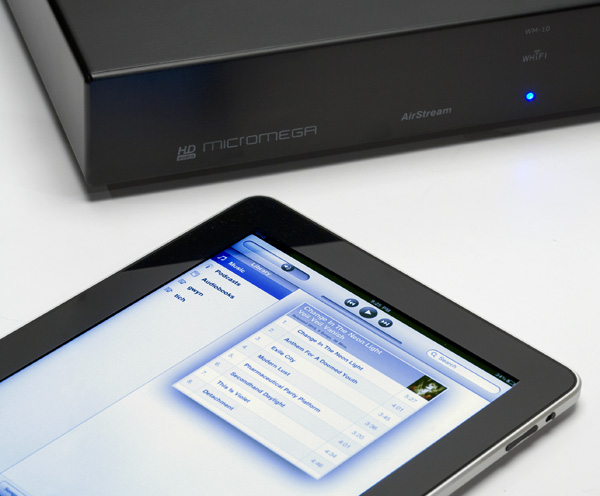
A sound improvement
Best of all, the difference between the sound of the Airstream and a standard AirPort Express is substantial. Just eliminating the switching mode power supply from the equation, by not having an AirPort Express anywhere near your system, is a big plus to start. The Airstream uses a much more expensive R-Core transformer and beefier analog power supply in addition to a custom designed digital processing clock that drives jitter specification errors dow to very low levels. Time bases jitter processing errors seem to be very audible to the brain; Micromega has 25-years of digital design experience and saw this obvious area for improvement. Putting the components in a proper box with RCA outputs also makes it easier to use the Airstream with an adequate pair of cables, rather than the eighth-inch mini jack from the AirPort Express. Eliminating the Ethernet connection also helps. Using the AirPort while running network data and a printer attached via USB makes for relatively lousy sound quality.
My only gripe regarding the Airstream is that I would have liked to see Micromega use a smaller case, something more like the size of a Naim HiCap power supply, for several reasons: it might have shaved a few bucks off the bottom line, it would free up more rack space, and it would look like there is more in the box.
However, a quick listening comparison reveals that there is a big difference in sound quality between the AirPort and the Airstream. There is a definite lack of graininess to the presentation that is present in the Airport, and more smoothness to the high end. I would draw a similar comparison to the difference in playback between my $85 Shure M97 and my $1,000 Lyra Dorian cartridges.
The native DAC inside the AirStream is a sophisticated Cirrus Logic 4344 24/192 design nestled inside a Marvell custom made chip-set that will allow native extended-bit conversion to be accomplished once Apple switches their iTunes music offerings over to high-res files. 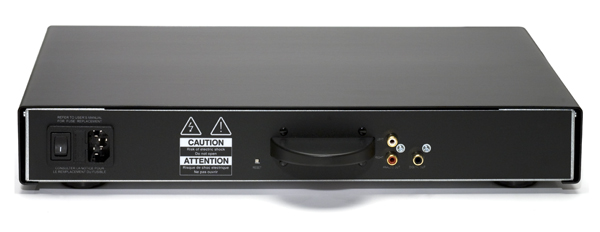
At present, because the Airstream relies on Apples Airtunes wireless transmission protocol, it will only play 16bit-44khz files native via iTunes and will downsample any high res files you might be collecting on your hard drive.
Is it for you?
Of course, the question on everyone’s mind is, “Is this thing worth $1,500?” Like everything, beauty (and convenience) is in the eye of the beholder. If you aren’t concerned with ultimate fidelity, you can probably get by with an Airport Express. But if you want a better sounding, more audiophile product, the Airstream is excellent. Designer Daniel Schar has 30 years of digital circuit design experience and it shows in the end result.
I see two standout scenarios for the Airstream, both of them good. Paired with your laptop or even a Mac Mini with a large hard drive, it could make for an excellent budget music-server system. If you are a network whiz, or have access to one, the Airstream could be an excellent remote client for a Sooloos, QSonix or other music server in another area of your home.
The bottom line is that if you want the convenience of using a product like this right now, with far better sound quality than the Airport can provide and that offers the convenience of fitting on your equipment rack, I think the Micromega Soundstream is a worthy product.
The Micromega Airstream
MSRP: $1,499
Manufacturer website: www.micromega-hifi.com
US/North America contact: www.audioplusservices.com





